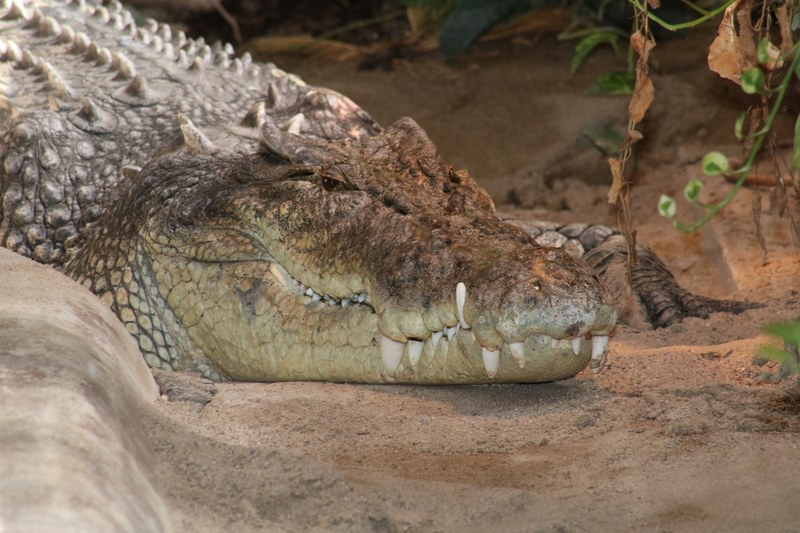
John, a Saltwater Crocodile, dies following complications from surgery.
John, a Saltwater Crocodile, dies following complications from surgery.
One of the ABQ BioPark Zoo’s longtime residents, John the saltwater crocodile, passed away earlier this week after complications from surgery. His death concludes an incredible saga that started with his journey to the United States from Australia and ended with an innovative surgery to repair a broken jaw.
In late July, John sustained a severe upper jaw injury. The exact cause is unknown, but staff speculated he had played too aggressively with an enrichment item overnight. The BioPark veterinary team, together with outside experts including Dr. Peter Schwarz from Veterinary Emergency and Specialty of New Mexico, performed surgery on July 29 to install three steel plates to support John’s jaw while it healed.
Reptile bones heal more slowly than those of mammals, but veterinary staff were optimistic that he would make a full recovery. He was able to eat normally and resumed all his regular activities shortly after the surgery.
The same physiology that allows a crocodile to thrive in a wetland ecosystem also makes surgery a high-risk endeavor. Crocodiles can hold their breath for nearly two hours to stay submerged in water. By simply not breathing, a crocodile can resist the anesthetic gasses that vet staff use to sedate it. Crocodiles can also conserve energy by limiting oxygenated blood flow to their extremities and slowing their heart rate to beat 2-3 times per minute. This makes it extremely difficult to monitor a crocodile’s vitals during surgery. The slow flow of blood through their bodies means anesthesia reversal agents have a delayed effect on large crocodiles.
On October 21 staff noticed that the plate on the top of John’s jaw was loose, and they performed a follow up surgery on Monday, October 26. While John’s caretakers were cautiously optimistic for a positive outcome, John sadly did not survive recovery despite showing favorable signs immediately following surgery. A necropsy will be performed.
John was estimated to weigh about 1,100 pounds, at the high end for male saltwater crocodiles. After he was fully anaesthetized, the veterinary staff received help from eight additional BioPark staff members to move John into position for surgery.
John has not been visible to zoo guests since March 2020; the indoor saltwater crocodile habitat closed to guests due to COVID and remains closed for ongoing renovation and repair work in the public viewing area.
John came to the ABQ BioPark in 2005 with another saltwater crocodile named Joe. The two had been nuisance crocodiles in Australia and were living temporarily at Crocodylus Park in Darwin, Northern Territory. Their journey to Albuquerque presented many challenges, not the least of which was how to find vehicles large enough for two crocodiles that weighed over 1,000 pounds each and measured between 14-15 feet long. Finally, in March 2005, the two crocs were flown to Los Angeles and then driven to Albuquerque by two truck drivers named John and Joe—this is how the crocodiles got their names.
John’s exact age is unknown. He lived at the BioPark for 16 years and was a mature adult when he arrived. His companion Joe passed away in 2014 due to liver failure.
While the ABQ BioPark is sad to say goodbye to John, it remains committed to educating guests about saltwater crocodiles. The Zoo will welcome new saltwater crocodiles as one of the headlining exhibits of the upcoming Australia exhibit. The exhibit will offer increased space for the species as well as underwater viewing opportunities for guests.
MEDIA: Photo and video of John the saltwater crocodile is available here.
